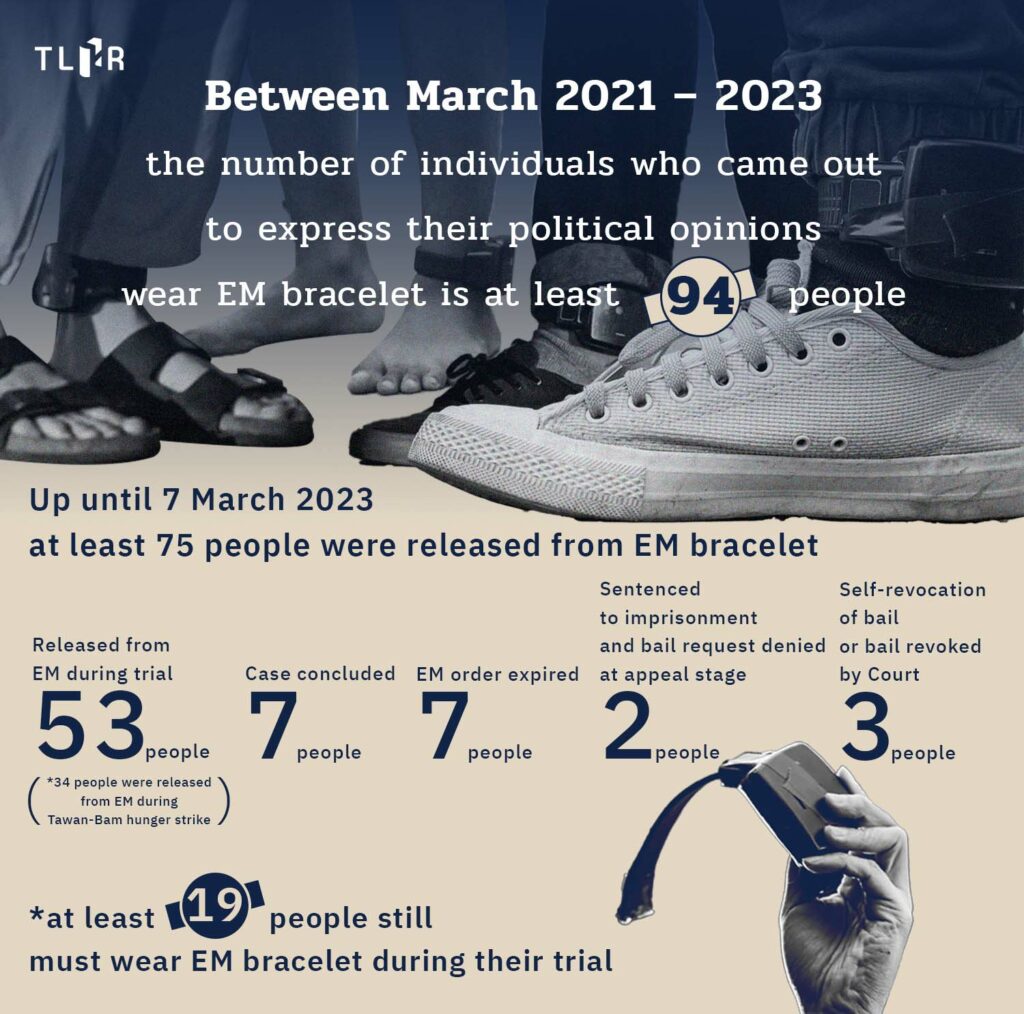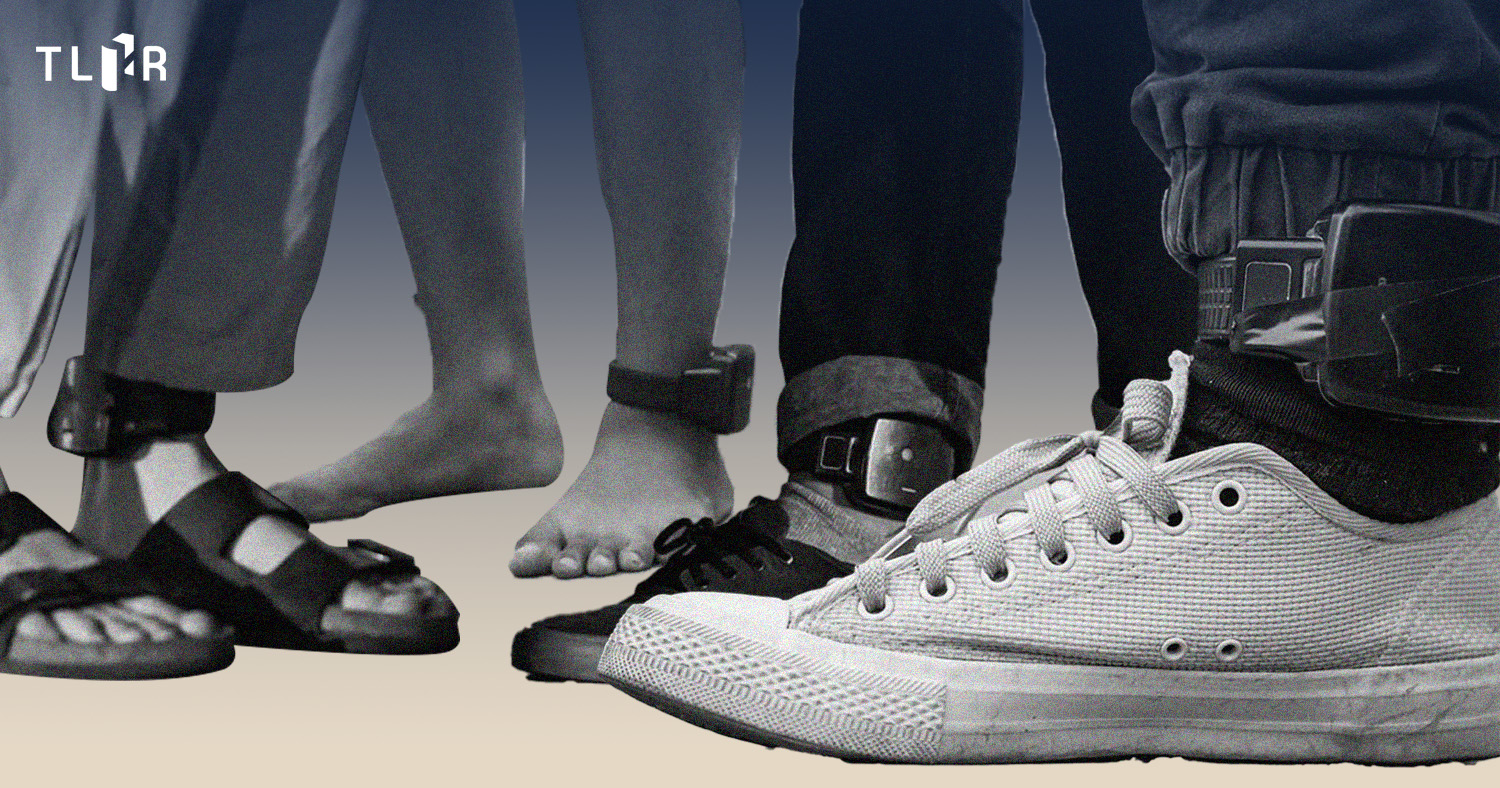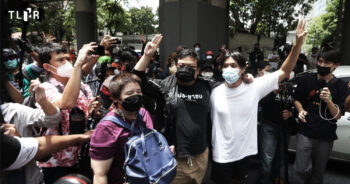In April 2022, Thai Lawyers for Human Rights (TLHR) has concluded the statistics of politically prosecuted activists and civilians who were ordered by the Court to wear the EM ankle bracelet as part of their bail conditions. The statistics revealed that at least 61 individuals were ordered to wear an Electronic Monitoring (EM) ankle bracelet from March 2021 to 2022 with 7 of them being tagged with the EM bracelet since 2018.
Up until October 2022, TLHR discovered 19 more individuals who were ordered to wear the EM bracelet during trial, leading to the total number of 80 individuals with EM bracelets. In the meantime, at least 24 individuals were granted permission by the Court to remove EM bracelet.
As of 10 October 2022, at least 56 individuals had to wear the EM bracelet, an increase from 38 individuals in April 2022. Based on these statistics, ordinary citizens and activists who expressed their political opinions were more likely to be ordered to wear the EM bracelet. During such time, 17 individuals were subjected to curfew while 2 of them were subjected to 24-hour house arrest.
Wearing EM bracelets can lead to health problems on body parts against which the bracelets constantly rub. In the case of “Big” Kiattichai Tangpornphan, he had to wear a loose bracelet for around a month, causing injury to his ankle. His injury notwithstanding, the court denied his motion to remove the bracelet. Moreover, EM bracelets limit travel options (e.g., by plane to other provinces), the ability to pursue certain careers, and cause the person to be unfairly judged by the society (e.g., the case of Bam Orrawan). EM bracelets also adversely affect the mental well-being of their wearers.
34 people were released from EM bracelet during “Bam-Tawan” hunger strike

In March 2023, TLHR recounted the number of the individuals and activists who were ordered to wear the EM bracelet again, finding that at least 94 individuals were required to wear EM bracelet between March 2021 and March 2023. Among the 94 people, 75 individuals have been released from the EM bracelet (as of 7 March 2023). At least 53 releases were ordered by the Court during trial, 7 due to the conclusion of the case, 2 due to the Court’s sentence of imprisonment without bail at the appeal stage, and 3 due to the Court’s or the individual’s voluntary revocation of bail.
Even though at least 19 people are still attached with EM bracelets, the number has dropped from 56 people in October 2022.
The number of individuals with EM bracelets has constantly decreased since 18 January 2023 as “Tawan” Tantawan Tuatulanon and “Bam” Orrawan, independent activists, revoked their own bail to protest the Court’s injustice and reclaim the right to bail for the other inmates who were pressed with charges as a result of their political expressions. Later on, Tawan and Bam escalated their level of protest by engaging in dry fasting.
TLHR has found that, in the period of less than 2 months, from 18 January to early March 2023, up to 34 individuals and activists were granted release from EM bracelets during their trial.
Despite several activists’ attempts to remove the EM bracelets in 2022, the Court often dismissed their requests, as exemplified by the case of “Lookkate” Chonticha Jangrew. She posted the story of her EM bracelet removal requests several times on Facebook. Due to the negative effects of the EM bracelet on her mental health and career, Lookkate was recently granted the request to remove EM bracelet.
On the opposite side, there have also been requests for the removal of EM bracelets in the past two months that the court denied. This could be found in the case of “Jinny” Jiratchaya Sakulthong, who is being prosecuted for contempt of court and was ordered to wear the EM bracelet while she is released on bail. Her request to remove the EM bracelet in February 2023 was denied by the Bangkok South Criminal Court.
There were also 7 cases of activists who were released on bail in February and were ordered to wear EM bracelet as part of their bail condition. These include the case of Sombat Thongyoi and “Kong” Ukrit who were charged with Section 112, Kongpetch, and 4 Thalu Gas activists.
Permission to remove the EM bracelet would allow individuals and activists to travel to court more conveniently, especially courts in other provinces, instead of traveling by car or train which would cost more time and accommodation expenses.
Meanwhile, individuals who are under curfew are able to travel back and forth to work as usual due to the Court’s permission to remove the EM bracelet in 2023, thereby canceling the curefew conditions by default. It should be noted that the court still imposed on certain defendants a condition requiring them to report to the court on a monthly basis.
The negative impact on life and mental well-being of those who have spent months, if not years, with EM bracelet has already manifested. It appears that there will be no remedy for these individuals.




